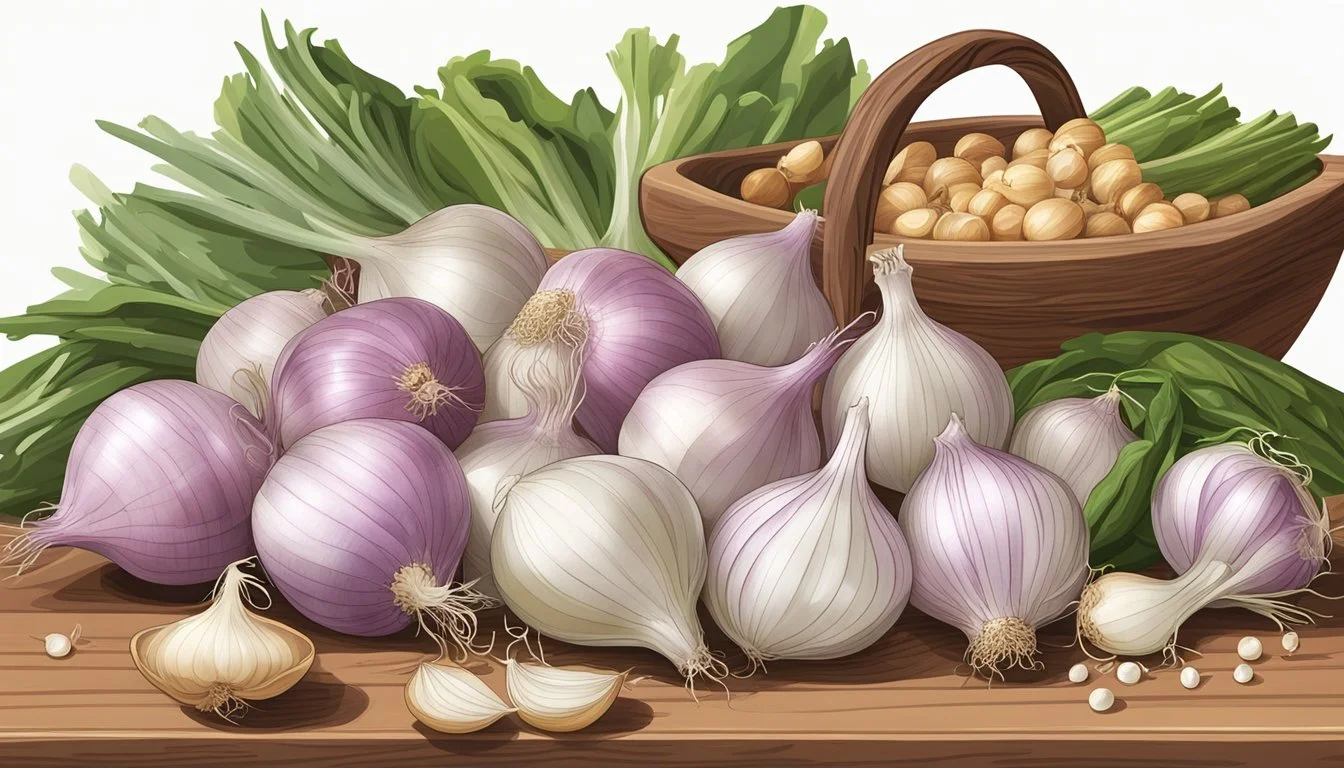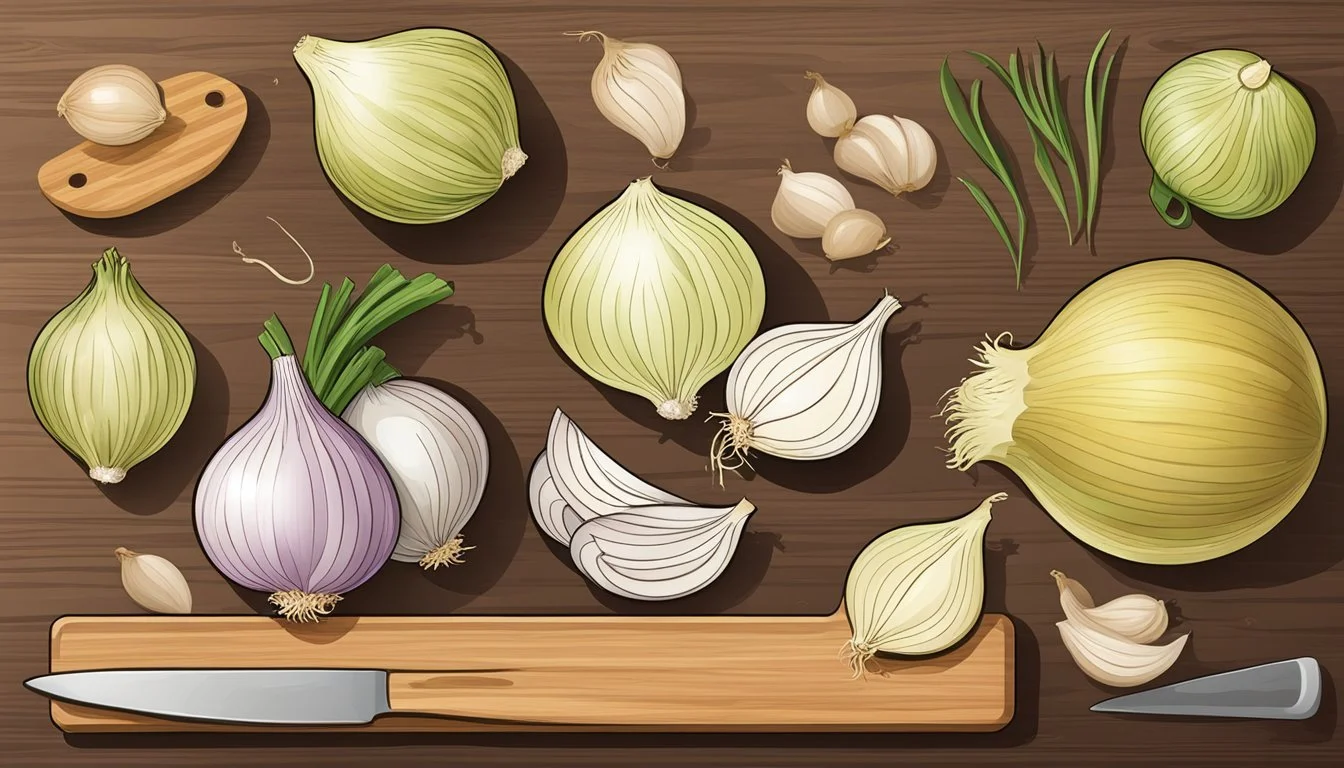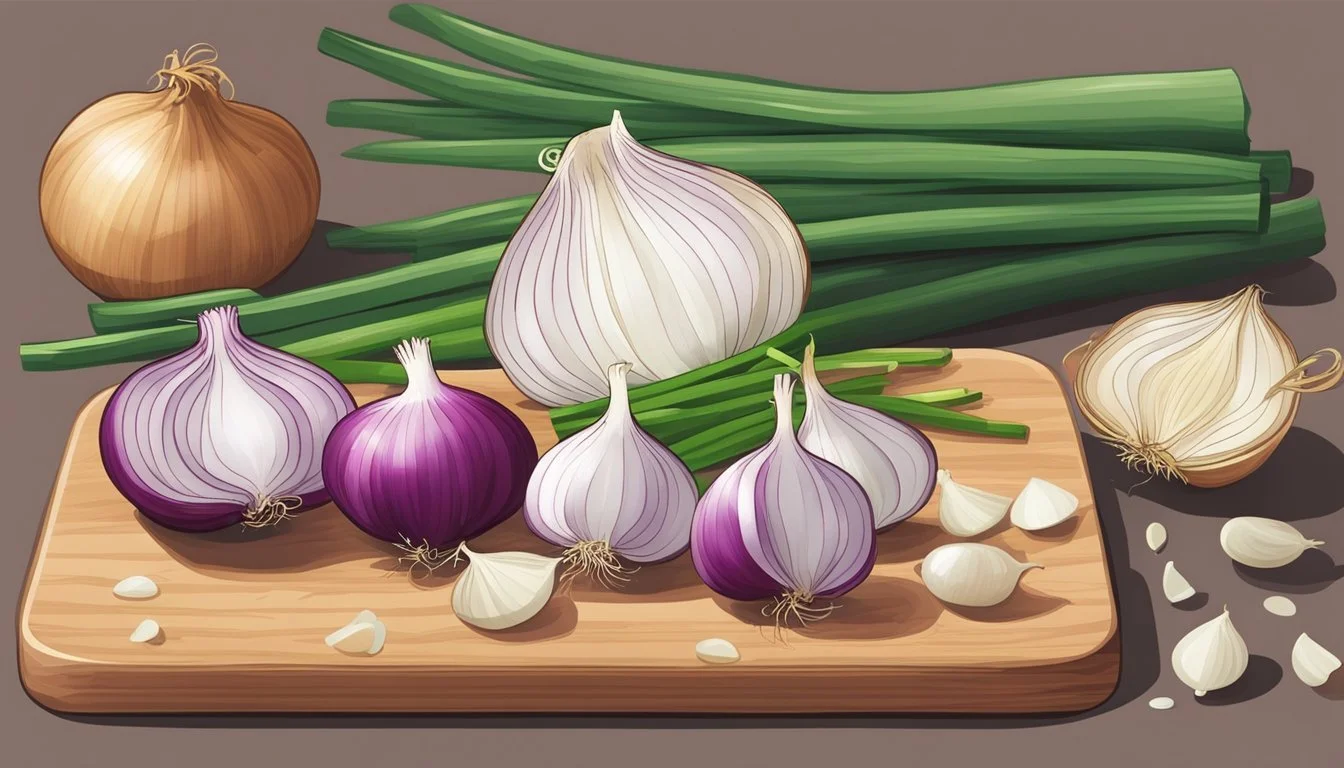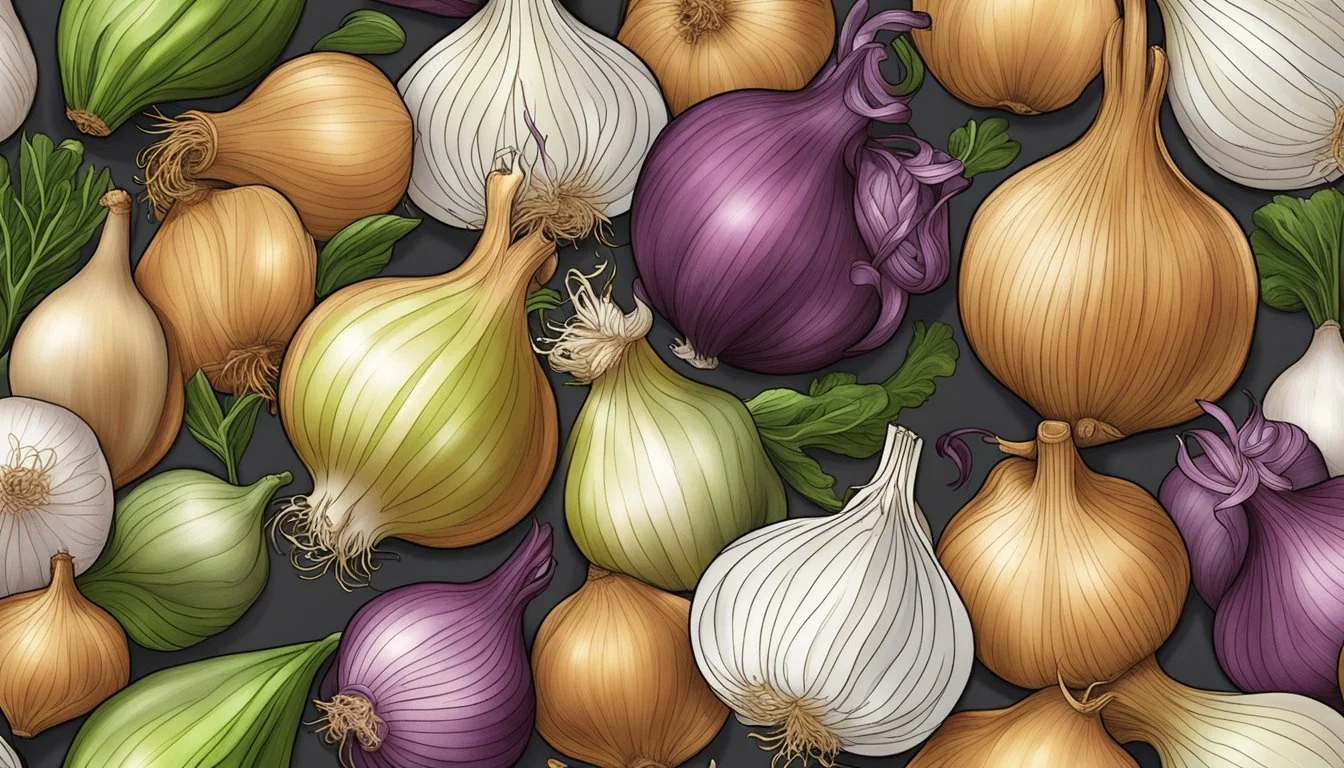Cipollini Onions Substitutes
Best Alternatives for Cooking
Many cooks and food enthusiasts love using cipollini onions for their delightful sweetness and unique texture in various dishes. Yet, there are times when these petite gems might not be readily available. So, what can you do when your recipe calls for cipollini onions, but you don't have any on hand? Consider using substitutes such as pearl onions, Vidalia onions, or even garlic, which can provide similar flavors and textures in your culinary creations.
Pearl onions are a popular choice as they closely match the size and sweetness of cipollini onions. They can be used in a 1:1 ratio, making them an easy swap for stews, roasts, and side dishes. Vidalia onions offer a milder flavor with a bit of sweetness, thanks to their low sulfur content. They can be a great alternative for recipes requiring sliced or cubed cipollini onions.
If you're looking for a more intense flavor, garlic can be an interesting substitute. Whole garlic cloves can replace whole cipollini onions in a beef stew, while minced garlic can stand in for chopped cipollini onions. Exploring these substitutes ensures you can still enjoy flavorful dishes, even when cipollini onions are out of reach.
Understanding Cipollini Onions
Cipollini onions are small, flat onions known for their sweet flavor and unique culinary applications. Their distinctive size and shape make them ideal for certain dishes, offering a tender texture and rich taste.
Flavor Profile of Cipollini Onions
Cipollini onions are cherished for their sweetness and mild taste. Unlike typical onions that have a tangy bite, these onions offer a nuanced flavor that is smooth and less pungent. When cooked, their sugars caramelize, enhancing their sweetness further. This makes them perfect for roasting or caramelizing, as they develop a rich, slightly buttery taste that can elevate any dish. Their subtle acidity adds depth without overpowering other ingredients.
Common Uses in Dishes
Cipollini onions are versatile and used in a variety of dishes. They excel in roasting due to their high sugar content, yielding a caramelized, tender result. They are also favored in stews and braises, where their texture softens and melds well with meats and other vegetables. These onions can be pickled or used in salads to add a sweet crunch. Furthermore, Cipollini onions are fantastic for sautéing and adding to pasta sauces, where their flavor can shine through without dominating the dish.
Size and Shape Characteristics
Cipollini onions are notably small and flat, resembling mini saucers. Typically, they are about one to two inches in diameter. This unique shape allows them to cook evenly and quickly compared to larger onion varieties. Their thin skin is often golden-brown, encasing a firm, yet tender flesh. This makes peeling a bit challenging but worth the effort for the taste they provide. Their compact size and shape make them ideal for whole roasting or sautéing in dishes that require uniform cooking times.
These distinctive characteristics of size, shape, and texture, combined with their sweet flavor, set Cipollini onions apart, making them a valuable addition to various culinary creations.
Choosing Substitutes for Cipollini Onions
Finding the right substitutes for cipollini onions can be crucial for maintaining the desired flavor and texture in your recipes. It's important to consider both the flavor profile and the cooking method when selecting an alternative.
Considerations for Selecting Alternatives
When selecting a cipollini onion substitute, the flavor and texture play critical roles. Cipollini onions are known for their sweet, mildly pungent taste and small, flat shape, which caramelizes well. Some suitable substitutes include:
Pearl Onions: Almost the same in size and sweetness, though slightly less sweet. They are excellent for roasting.
Borettana Onions: Another small, sweet onion, similar in shape, which is perfect for grilling or sautéing.
Boiler Onions: These small, round onions work well in stews and soups due to their firm texture.
Baby Onions: Tender and mild, these are quite versatile and can be used similarly to cipollini onions.
Consider what the onion's role is in your dish—whether it's as a base flavor, a garnish, or a main ingredient—when making your choice.
Best Overall Substitutes
The top substitutes for cipollini onions include:
Pearl Onions: Their similarity in size and sweetness makes them a top choice. They also hold up well in a variety of cooking methods.
Vidalia Onions: Known for their sweet and mild flavor, Vidalia onions are good for recipes requiring a tender onion. Their low sulfur content gives them a distinct, gentle taste.
Shallots: While not identical, shallots offer a more complex flavor profile with a hint of garlic, making them excellent for sautéed dishes.
Garlic (minced or whole cloves): While stronger in flavor, garlic provides a rich taste when roasted or sautéed and can substitute chopped cipollini onions in various recipes.
Tables or lists can help to effectively summarize the information:
Substitute Use Case Flavor Profile Pearl Onions Roasting, Soups Sweet, Mild Borettana Onions Grilling, Sautéing Sweet, Slightly Pungent Vidalia Onions Sautéing, Garnish Very Sweet, Mild Shallots Sautéed Dishes Mild, Complex Garlic Various (minced/cloves) Strong, Rich
Choosing the right cipollini onion substitute can significantly impact your dish, ensuring you achieve the desired taste and texture with each bite.
Specific Substitutes Based on Dish Type
When replacing cipollini onions in various dishes, it's essential to consider the dish type to achieve the desired texture and flavor. Substitutes can vary greatly depending on whether the onions are used raw, cooked, or pickled.
Substitutes for Raw Applications
For raw applications, where the mild, sweet flavor of cipollini onions shines, several substitutes work well. Vidalia onions are an excellent choice due to their similar sweetness and mildness. They can be sliced thinly and used in salads or sandwiches. Red onions are another alternative; they add a bit more color and a slightly stronger taste but can be sweet and enjoyable when raw. Green onions (scallions) are also suitable; while milder and less sweet, they offer a fresh and crisp texture.
Substitutes for Cooked Dishes
In cooked dishes, it’s crucial to find a substitute that maintains a balanced sweetness and caramelizes well. Pearl onions are a top contender due to their similar size and sweetness, making them ideal for roasting and stews. Shallots provide a delicate sweetness and soften beautifully when cooked, suitable for sauces and sautés. Yellow onions offer robustness when caramelized, though they are slightly less sweet. Sweet onions like Walla Walla can be used similarly, offering a tender and sweet profile when cooked.
Substitutes for Pickled or Preserved Uses
For pickled or preserved uses, choosing a substitute that retains crispness and absorbs pickling flavors is essential. Pearl onions are again a strong option, holding their shape and texture well when pickled. Red pearl onions can add an appealing color and mild sweetness. Shallots, when pickled, offer a more nuanced and delicate flavor than cipollini onions, suitable for gourmet pickles. White onions, being firmer, also work well in pickling, providing a crisp texture and subtle sweetness.
Avoid choosing onions with a very pungent flavor for pickling, as they can overpower the delicate pickling spices and brine.
Technical Aspects of Substitution
When substituting Cipollini onions, it is crucial to adjust both cooking times and manage flavor differences to ensure the best results. Different substitutes bring unique characteristics that can affect the texture, flavor profile, and overall outcome of a dish.
Adjusting Cooking Times
Cipollini onions are known for their small size and soft, sweet texture, which allows them to cook relatively quickly. When using substitutes like pearl onions or shallots, it is essential to note their cooking times:
Pearl Onions: These cook similarly to Cipollini onions. Their small size and similar texture mean they can often be substituted without changing cooking times significantly.
Shallots: Usually cook faster than Cipollini onions due to their smaller size and thin layers. Adjust your recipe by reducing the cooking time slightly to prevent overcooking.
Garlic: When using garlic as a substitute, keep in mind that whole cloves cook faster than Cipollini onions and can become bitter if overcooked. Minced garlic requires an even shorter cooking time.
Managing Flavor Differences
Cipollini onions have a distinct sweet and mild flavor that other onions may not replicate exactly. Managing these flavor differences is key:
Pearl Onions: Offer a mild onion flavor similar to Cipollini onions, making them an excellent substitute. Their sweetness and tender texture enhance the dish without drastic changes to the flavor profile.
Shallots: Slightly milder and sweeter than regular onions, they can mimic the sweetness of Cipollini onions well. They are best used in recipes where a less strong onion flavor is desired.
Garlic: Provides a much stronger and distinct flavor. When using garlic as a substitute, use sparingly to avoid overpowering the dish. Whole cloves can add a rich, sweet aroma when roasted but should not replace more than a few Cipollini onions to keep the flavors balanced.
Adjusting for these variations ensures that the substitute complements the dish's intended taste and texture.
Practical Tips for Substitution
When replacing cipollini onions in recipes, several factors need consideration, such as measuring quantities and matching flavors.
Measuring Substitutes
Accurately measuring substitutes ensures the desired outcome in a recipe. Cipollini onions are small and sweet; thus, matching their size is crucial. Pearl onions are a perfect substitute due to their similar size and sweetness.
Consider the following conversions for accuracy:
1 cipollini onion: Use 1 pearl onion.
Chopped cipollini onions: Match the volume by
Additional Substitutes for Specialty Cooking
For intricate cooking methods like grilling and baking, different substitutes for cipollini onions can better enhance specific dishes. Each substitute has unique attributes that make it ideal for various culinary needs.
Substitutes for Grilling
When it comes to grilling, the choice of onion can dramatically influence the texture and flavor of the dish. White onions are a robust substitute for cipollini onions. Their firm texture holds up well under high heat, providing a bright, pungent flavor that's slightly milder when grilled.
Sweet onions, particularly Vidalia onions, also shine in grilling recipes. Their high sugar content caramelizes beautifully on the grill, adding a sweet and mellow taste. The softer texture of Vidalia onions makes them easy to slice into rings or wedges, perfect for kabobs or as a topping for grilled meats.
For those who prefer a milder option, yellow onions can also be used. They balance sweetness and sharpness well, making them versatile for various grilled dishes. Their firm texture ensures they won't fall apart during cooking, providing a consistent flavor throughout the dish.
Substitutes in Baking
In baking, the choice of onion can affect both the moisture content and flavor of the final product. Scallions, with their mild flavor and delicate texture, work well in baked dishes where a subtle onion presence is desired. They can be finely chopped and mixed into breads, quiches, and savory pastries without overwhelming other ingredients.
Leeks are another excellent substitute for cipollini onions in baking. Their mild, slightly sweet flavor and tender texture blend well in dishes like tarts and casseroles. When using leeks, it's important to clean them thoroughly and chop them finely to ensure even distribution in the batter or filling.
Finally, pearl onions can provide a burst of sweetness and moisture in baked goods. Their small size makes them convenient for mixing into savory muffins or incorporating into baked vegetable medleys. Their similar sweetness to cipollini onions makes them a fitting substitute in recipes requiring a similar flavor profile.





